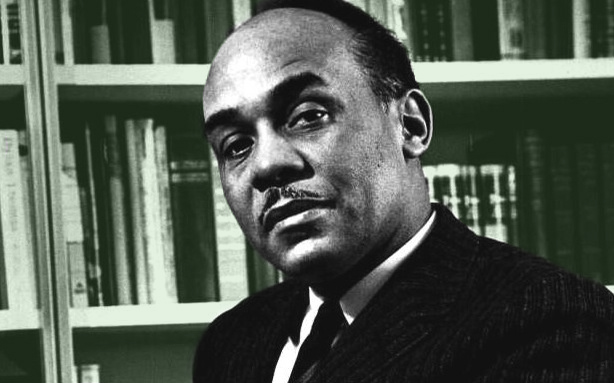
Ralph Ellision, one of the greatest novelists of the 20th century, writes to Albert Murray, a writer, Air Force pilot, a longtime friend, and fellow alumnus of Tuskegee Institute. Here, Ellison discusses the difficulty of writing, Invisible Man, and his mixed feelings on the Tuskegee Institute chapel, which had burned down a few months prior to this letter.
Dear Albert:
This has been one of our longest silences, which means that the world has really been too much with us. I’ve been up to my ass in typescript and have only just climbed out of one level of the mess after another back to my novel. Last year I made the mistake of agreeing to do an essay on the novel for an anthology edited by Granule Hicks and which will include people like Bellow, Wright Morris & Herb. Gold and which Macmillan will publish. But I got bogged down on the damn thing for two months, perhaps because I was resisting the necessity of leaving old Bliss and Cliofus and Severn and Love to deal with The Novel and those who say the form is dead. Fuck Trilling and his gang, I know that a novel is simply hard to write, especially during this time when you can’t take anything for granted anymore. Anyway I’ve finished that piece and I hope they use it. The other piece I probably mentioned is a piece on desegregation, which is still in the works. It deals quite a bit with literature and I’m hoping to make a short book of it at the suggestion of Robt. Penn Warren. I’ve begun to look closely at the Civil War period and have dredged some interesting stuff out of Hemingway and Fitzgerald. The other writing news is that the Battle royal scene [from Invisible Man] has turned up in A Southern Harvest along with all those Southern big names, which amuses me to no end because it must mean that I’ve sold my soul to the crackers! Flying Home, that long and not too smooth story is appearing in an anthology of writing edited by Charles Fenton of Yale, to be published by Viking (W. W. II, that is). I picked up a book of criticism published in England under the title, Catastrophe & the Imagination, which gives Invisible lots of space and picks it for a short list of novels which that wild stud thinks will be of interest a century from now. Surely the man must be on the weed. The other project is an interview of Warren for the Paris Review, which, if they don’t cut it too much, should be one of their more interesting. […]
[…] The news about the chapel was rather shocking; I guess I loved the old place; so much of what I hated about Tuskegee took place there as did so many of its lost possibilities come to focus there. Perhaps the burning is symbolic. I had hoped to see it again, now it will become the occasion for some more stealing and more bad design and construction work and a hell of a lot of self-congratulation and pious bullshit when the new chapel is completed. One of these days I’m really going to put the bad-mouth on those scobes; here Africans and West Indians are taking over governments and Montgomery Negroes are showing their quality and they continue to act like this is 1915. Foster[1] should be ashamed of himself. Well, man, world events are justifying our position and interest of the thirties, not those of the administration or the campus heroes and politicians; we are operating out of a different sense of time and on a different wave-length. Maybe Foster will see the lights and be a man….Love to your girls from Fanny and me––Say, when do you go home?
Ralph
FURTHER READING
Saul Bellow’s review of Invisible Man, published in Commentary (June, 1952)


